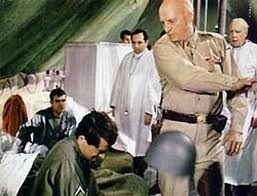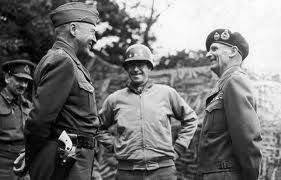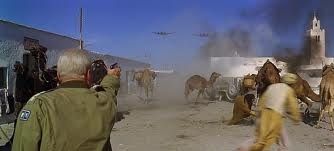1970 Patton
"I love it. God help me I do love it so. I love it more than my life."
As you may have guessed by the name, this is a movie about General George S. Patton during WWII (please note that in order to address the characterization of Patton in this film, I will be discussing events in the movie out of order).
It's
a highly entertaining movie, and portrays a complicated and intriguing
historical character. Patton is depicted as a mix of both great virtues
and great vices.
I ponder how accurate this portrayal of Patton is -I would be interested in researching him. The movie paints a picture of a complex personality, larger than life, both hated and loved.
I ponder how accurate this portrayal of Patton is -I would be interested in researching him. The movie paints a picture of a complex personality, larger than life, both hated and loved.
His
WWII career is full of highs and lows. The movie begins with him in
Morocco, disgruntled not to be fighting Germans. When his superiors
send him to Tunisia to face Rommel's troops, he is elated, and makes a
great
success of it. Next, he makes a huge splash in his march across
Sicily. Then there's the slapping incident,
when he hits a man suffering from shell shock in front of a hospital
full
of witnesses, and threatens to do worse. He is dismayed when this costs
him his command, and a shot at being supreme commander of the allied
forces. He is left to act as a decoy, leader of an imaginary army,
in
order to throw off the Germans, which is pretty successful, as they
cannot fathom a general being taken out of the war over slapping a
soldier. Tyler says Rommel probably could've shot a soldier and gotten
away with it, no problem.
Being sidelined is very distressing to Patton, but he is
religious and believes that God has a great destiny for him: "The last
great opportunity of a lifetime - an entire world at war, and
I'm left out of it? God will not permit this to happen! I will be
allowed to fulfill my destiny! His will be done." He's so downcast
that it made me feel sorry for him, and think "Aww, give him another
chance! He just wants a command! At least listen to his ideas!" At
last, he is reassigned as head of the Third Army in France, and the guy
is so happy, you just have to be happy for him. After victory in
Europe, Patton shoots his mouth off again (about the Russians this time,
and about not pushing de-Nazification), and is denied a command in the
Pacific.
Patton
is first brought to North Africa because of the poor performance of the
Americans against the German forces. They need somebody to shake
things up and get things done:
General Bradley: What we really need is... someone tough enough to really pull this outfit together.
Brigadier General Hobart Carver: Patton?
Bradley: Possibly.
Carver: God help us!
Brigadier General Hobart Carver: Patton?
Bradley: Possibly.
Carver: God help us!
Patton
immediately starts enforcing strict discipline, holding the men to a
new set of extremely high standards of military professionalism:
"Gentlemen, from this moment, any soldier without leggings, without a
helmet, without a tie, any man with unshined shoes or a soiled
uniform... is going to be skinned." He notes, "You want to know why this outfit got the hell kicked out of it? A blind
man could spot it. They don't act like soldiers; they don't look like
soldiers; why should they be expected to fight like soldiers?"
There's no more slacking off, and no more bending of the rules under his
watch. He gets his men in line, tearing down tawdry photos ("This is a
barracks; it's not a bordello."), and even insisting that the unit's
doctor wear his helmet while in the hospital, in compliance with army
regulations. When the doctor protests that he can't use his stethoscope
with his helmet on, Patton turns back to him and growls, "Well, then
cut two holes in your helmet and see that you can." I can't help
wondering what Patton could've done with the men in Platoon (that review
to come later). Those men were so unregulated and wild it was
horrifying. Granted, Vietnam warfare was not Patton's type of warfare.
Still, I would love to see Patton Meets Platoon: Patton shaking those
guys up into model soldiers.
He
is very charismatic, which is good for morale. His confidence is
contagious. As he and his troops head for Berlin, a soldier calls to
him, "Where ya goin', General?" Patton responds, "Berlin. I'm going to
personally shoot that paper-hangin' sonofabitch [Hitler, in case it
isn't obvious]."
He's brilliant as a commander, and makes great headway in Africa, just as he will later in Sicily, and then in France
and into Germany. Furthermore, he is a go-getter, known as a man who can get things done, and he lives up to that reputation.
He treats those fighting in the battlefield with extreme reverence: "This is where it pays off, the training and the discipline. No other
outfit in the world could pull out of a winter battle, move a hundred
miles, go into a major attack with no rest, no sleep, no hot food.
God... God, I'm proud of these men!"
He honors the men killed or wounded in battle. And to his credit, he
doesn't ask of his men anything that he isn't willing to do himself -in
other words, he walks the walk. He is out in the heat of battle, trudging through the mud and the snow with the rest of them.
He'll jump out of his vehicle and direct traffic if need be. When his
troops are getting strafed by German planes because their way is blocked
by two mules, he does what needs to be done and shoots the mules. It
might seem cruel, but his men are getting mowed down, and he isn't going
to let their lives be wasted because of two mules.
On
the other hand, he is a loose cannon who lives with his foot in his
mouth. He is worse than unsympathetic towards men with battle fatigue
(leading to the infamous soldier slapping incident that landed him in
such trouble). I won't quote him here, as his words disturb me. He
insults his British and Russian allies. He publicly makes grandiose
statements that get him in hot water.
Additionally, he is vain and self-centered, prideful and impulsive. In pursuit of victory and glory, he will go against orders and sacrifice the lives of his men. One soldier, seeing him go by, says, "There goes old blood-and-guts," and a fellow soldier caustically adds, "Yeah, our blood, his guts." General Bradley is put in charge of leading his men into a difficult situation under Patton's orders in order to support Patton's advance. All is chaos, and a soldier, not recognizing Bradley (played by Karl Malden, the priest in On the Waterfront), asks, "What silly son of a bitch is in charge of this operation?" Bradley humorously answers, "I don't know, but they oughta hang him." Patton is determined to defeat Rommel in battle, and after a victory is furious when he finds out that Rommel had been sent back to Berlin and he had defeated a different commander. His aide (and resident suck-up), Codman, tells him, "G2 also reports that Hitler probably retained Rommel in Berlin because things were going badly for the Afrika Korps. He didn't want his favorite general to lose face." Patton replies, "Well, I'm my favorite General. I don't want to be told that some second stringer is up against me. Then I lose face." In Sicily, Patton overtly pretends not to have received orders telling him to stop advancing, determined to outperform Montgomery.
 |
| Slapping incident. |
Additionally, he is vain and self-centered, prideful and impulsive. In pursuit of victory and glory, he will go against orders and sacrifice the lives of his men. One soldier, seeing him go by, says, "There goes old blood-and-guts," and a fellow soldier caustically adds, "Yeah, our blood, his guts." General Bradley is put in charge of leading his men into a difficult situation under Patton's orders in order to support Patton's advance. All is chaos, and a soldier, not recognizing Bradley (played by Karl Malden, the priest in On the Waterfront), asks, "What silly son of a bitch is in charge of this operation?" Bradley humorously answers, "I don't know, but they oughta hang him." Patton is determined to defeat Rommel in battle, and after a victory is furious when he finds out that Rommel had been sent back to Berlin and he had defeated a different commander. His aide (and resident suck-up), Codman, tells him, "G2 also reports that Hitler probably retained Rommel in Berlin because things were going badly for the Afrika Korps. He didn't want his favorite general to lose face." Patton replies, "Well, I'm my favorite General. I don't want to be told that some second stringer is up against me. Then I lose face." In Sicily, Patton overtly pretends not to have received orders telling him to stop advancing, determined to outperform Montgomery.
 |
| Generals Patton, Bradley, and Montgomery (Real life photo) |
Patton
believes in reincarnation, and that he has been a battle commander in
many ancient battles. General Alexander observes to him, "You know,
George, you'd have made a great Marshal for Napoleon, if you'd lived in
the 18th Century," and Patton responds, "Oh. but I did, Sir Alex, I
did." History fascinates him, and he loves to educate those around him
about what he has learned: "It was here. The battlefield was here. The
Carthaginians defending the
city were attacked by three Roman Legions. The Carthaginians were proud
and brave but they couldn't hold. They were massacred. The Arab women
stripped them of the tunics and swords, and lances. And the soldiers
lay
naked in the sun. 2000 years ago. I was here." I imagine that might
have gotten annoying if you were around him a lot. Nobody likes a
know-it-all.
He is enormously sentimental about war, and truly loves it, as Bradley points out: "There's one big difference between you and me, George. I do this job because I've been trained to do it. You do it because you love it." Captain Steiger, a German foe, recognizes Patton as a "pure warrior," astutely observing that, "The absence of war will destroy him." Indeed, as his role in the war winds down, you can see him shrinking back into melancholy. As he says to Bradley, "There's only one proper way for a professional soldier to die: the last bullet of the last battle of the last war."


I have been asked to write a guest review by my lovely wife to clarify some of the military events portrayed in the film. However, I think that her review was superb and encompassed all of the events and people portrayed better than I would be able too. I did fix the caption of the picture of Patton, Bradley and Montgomery though. Good job my love.
ReplyDeleteI like the review, and I liked the movie. I need to watch it again as it has been many years. One of the best war movies I have ever seen. Great acting. I do remember the slapping but not the words that went with it.
ReplyDelete